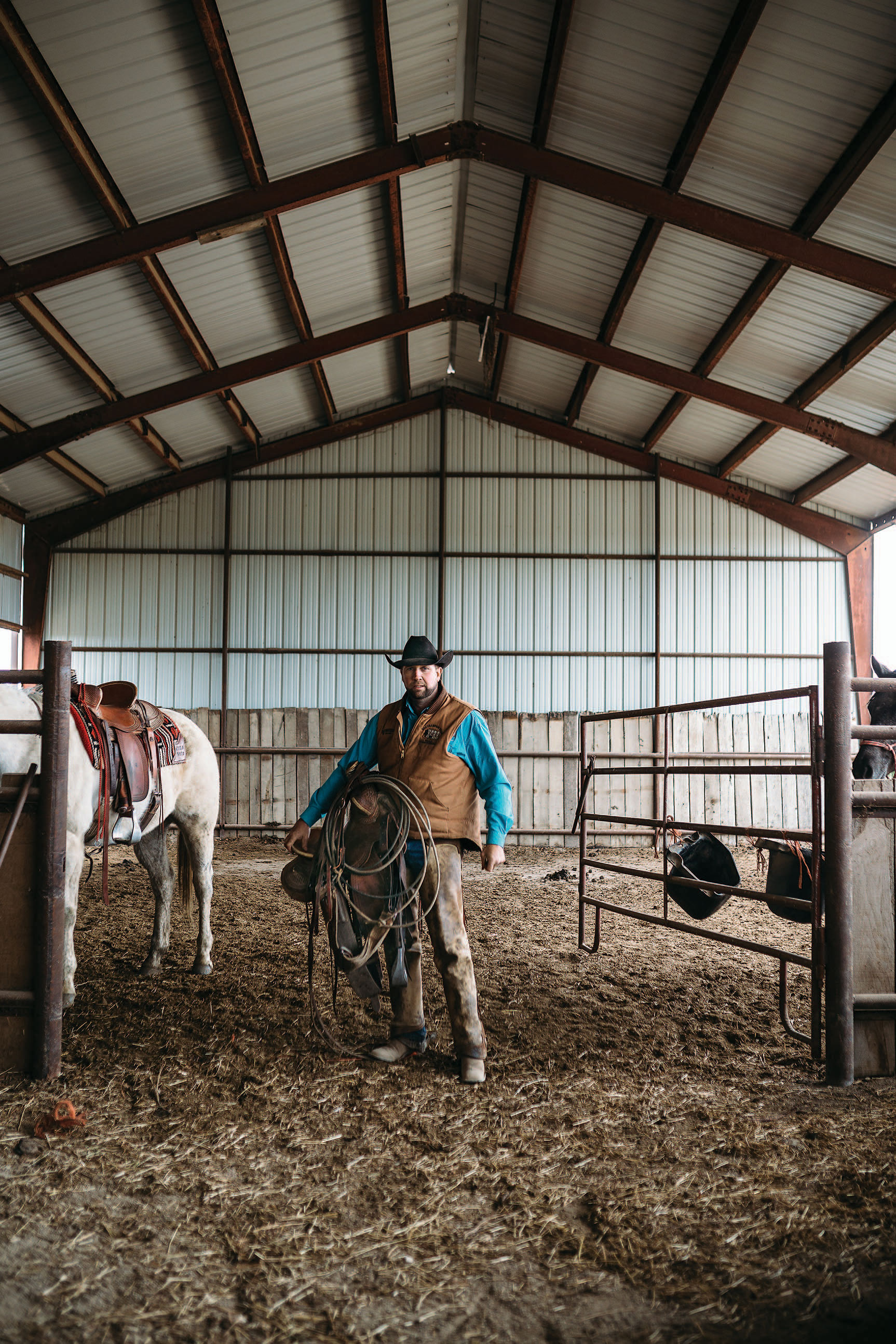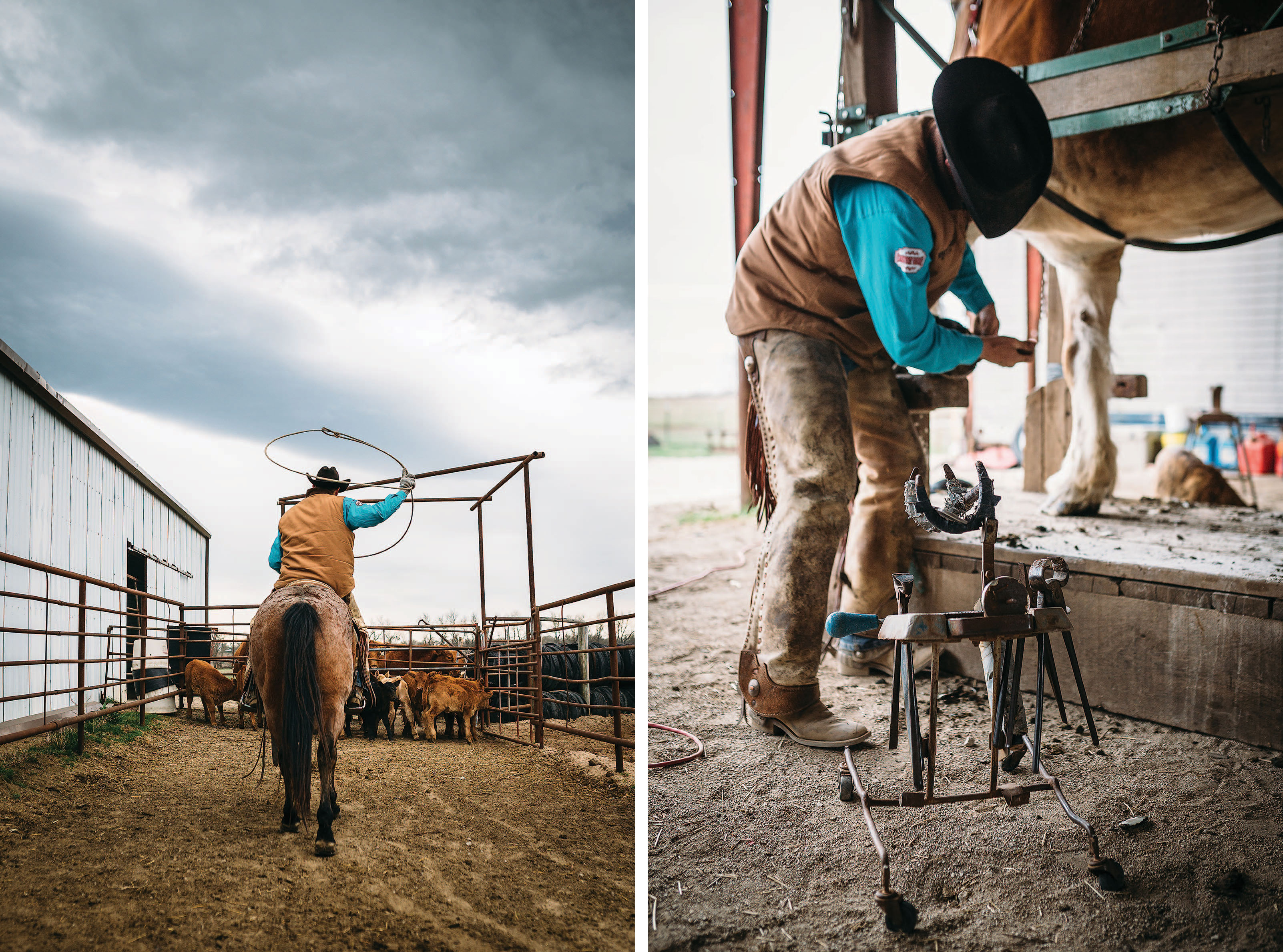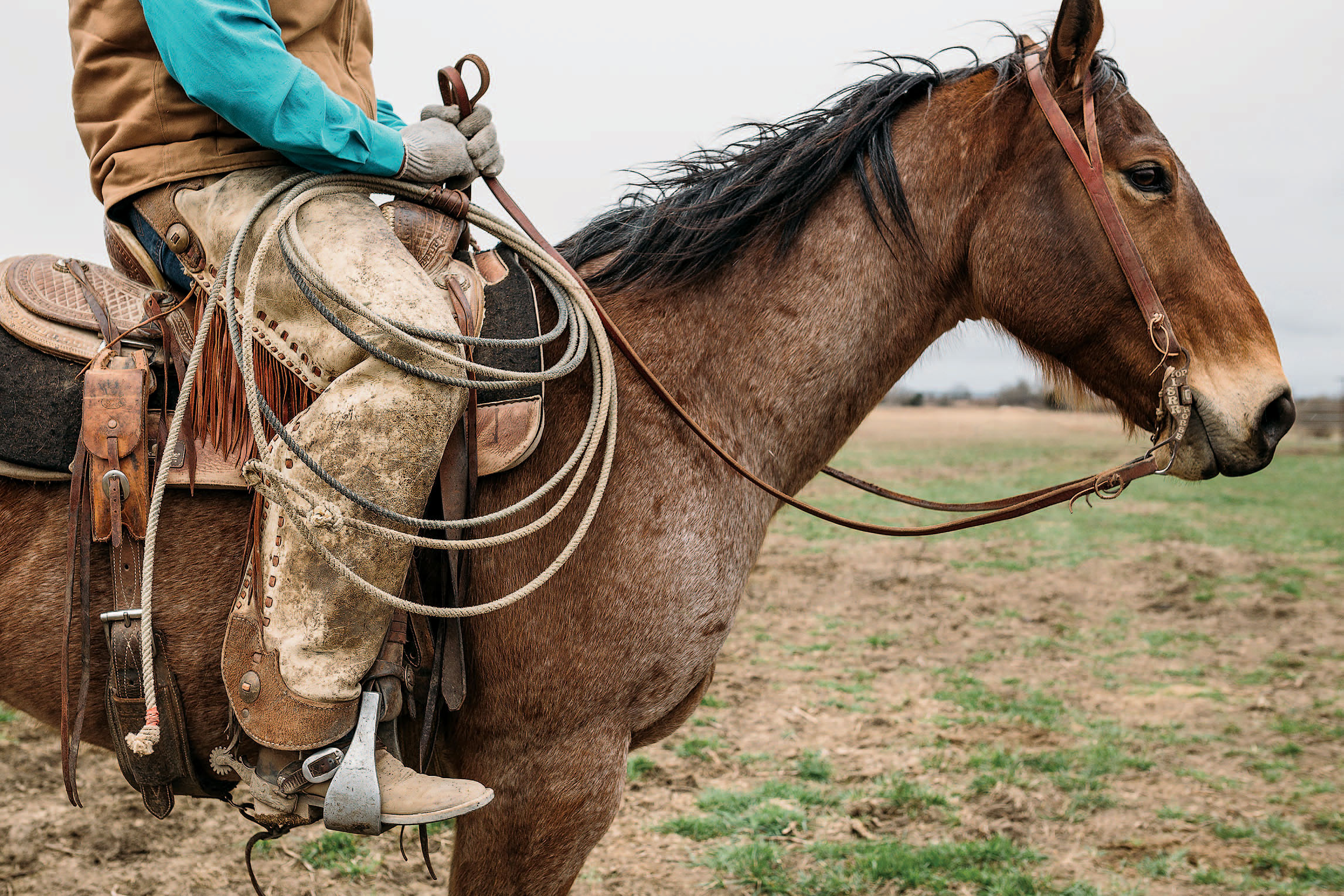To be the Working Ranch Cowboys Association world champion, you’ve got to live the cowboy life inside and outside of the arena. Travis Duncan does just that.
The trio of rider, horse, and calf swerve across the southeast Kansas pasture in a blur of hair and leather, topped by a swinging lasso. Travis Duncan sends the rope sailing through the air, swiveling it around the calf’s neck. The horse strains against the weight of the calf as Duncan steps off and ties the calf’s feet. As a man pulls his trailer around to load his runaway calf, the first job of the day is done.
Duncan wears many hats, but they are all cowboy hats. He is a “day worker,” a man people call when they need a hand. He wrangles dogies. He shoes horses. And he wears belt buckles that show off his success on his ranch rodeo team. His way of life is an uncommon one in these times. A forgotten one.
The old ways of the cowboy are dying out. The Bureau of Labor Statistics listed farmers and ranchers among the fastest-declining jobs in 2012, and the profession is projected to fall nearly 20 percent by 2022. The takeover by tycoons in the ranching industry is a big part of this decline. Today, most ranches are large-scale operations owned by big businesses, or family operations with full-time hired help. But Duncan isn’t a rancher; he’s a cowboy.
He doesn’t own the land he works on, and he isn’t a full-time hand. He does what people need him to do in a “have horse, will travel” business model. Some days he has a lot to do, and others he only scrapes by. But for Duncan, 38, this way of life has always been a given. He was raised around cattle and horses and has been hiring out for work since he was in high school. He’s done everything from vaccinating young calves to breaking horses to ride.
“It chose me, I guess,” Duncan says. “I didn’t want to go to town and get a real job, so I found a way to make it pay the bills.”

At 6:30 that morning, before chasing down the wayward calf, Duncan had walked out of the dimly lit doorway of his home and fired up his dusty white Dodge pickup after waking up his two boys, then 18-year-old Jarad and 9-year-old Gus (now ages 20 and 11), for school. He’d loaded his horse and headed to his first job of the day.
“Me and this college boy are about to go rope a wild steer,” Duncan joked to his girlfriend over the phone as he pulled into Dale Rickerson’s driveway.
Rickerson owns a construction company, but he also owns cattle to make extra money. Rickerson doesn’t employ full-time ranch hands — but he also doesn’t have the skills with a rope or a horse that Duncan has. This is when the cowboy comes in. If folks need his roping skills or an extra man to round up a herd, they call Duncan.
Duncan slowly rode out into the pasture and gave the herd a wide berth so he could get into position behind the calf. The calm of the morning was a stark contrast to the excitement and speed that would erupt only minutes later.
“Being an old, broke cowboy with no insurance kind of makes you wonder what we’re doing out here sometimes,” Duncan says later. “Anything can happen. My horse could fall down and break a leg.”
The true American cowboy doesn’t have health and retirement benefits. The pay can be spotty. And the job can be dangerous. The land in southeast Kansas is rocky, and Duncan races across it on horseback at top speed. When shoeing horses, he could be kicked and seriously injured. So why does he do it?
“That’s the million-dollar question,” Duncan says. “It keeps me outdoors, seeing new places and new people, and it keeps me out of a stuffy old office.”

After Duncan ropes the calf, he heads back to Rickerson’s home to collect his payment. While he was chasing the stray, all of his worries seemed nonexistent. It’s his job. He does it well and without a second thought. “Well, I made a hundred instead of having to go to the hospital,” he says as he climbs back into his pickup.
He fires it up and points his wheels toward his next job of the day, this time shoeing horses. While 90 percent of farriers are self-employed, the real money comes from working at full-service stables. Duncan says he’s not a farrier, though.
He’s a “cowboy horseshoer.” He has never had any formal training — he just knew it was something he could do and saw it as a way to make some extra cash. It also keeps him moving. “If I was at one place every day, I’d just get so damn bored,” he says.
Duncan holds the horse’s leg between his thighs and removes the first horseshoe. He wipes some sweat from his brow. This is one instance where even the iconic cowboy hat can’t always do his job justice. “I ought to be shoeing with my cowboy hat on, but that just wouldn’t be authentic — it gets too hot,” Duncan says, again wiping the sweat from his brow.
He will do two more jobs today: shoeing another horse and checking over a herd of cow-calf pairs. And he will go home tired but content. Tomorrow, he’ll pack a bag and head off to Medicine Lodge, Kansas, for a ranch rodeo. He’ll compete, maybe shoe a couple of horses in his downtime, and be back Monday, waiting for his phone to ring.
Soon after he gets home, Duncan’s phone lights up. But it isn’t for work. It’s a text message from Chris Potter.
“2015 World Champs,” it reads.
Potter is a ranch rodeo bronc rider and a member of the Lonesome Pine Ranch team from Cedar Point, Kansas. He’s been riding with Lonesome Pine since 2013.
“I’ve competed against them for years, and Chris has hit me up to ride with them before,” Duncan says. “I said, ‘All right, let’s give it a try.’ ”
Potter had been trying to get Duncan to ride with the Lonesome Pine Ranch rodeo team for years. They wanted him for the same reasons that ranchers hire him for day work.
“He rides a nice horse, he was experienced at rodeoing, and he ropes good,” Potter says. “We really liked the way he handled cattle in certain situations, and I just thought he’d be a really good asset to our team.”
Potter was right. The new Lonesome Pine lineup (Bud Higgs and his son, Troy; Potter; and Duncan) won two Kansas rodeos last year at Medicine Lodge and Council Grove, qualifying them for the Working Ranch Cowboys Association World Finals. A team has to win a sanctioned rodeo during the year to ride at the finals in Amarillo, Texas. They also took second in three others and third at one.
The WRCA World Championship Ranch Rodeo takes place over four days. Teams compete in five events over the first two days, and then a second round of the events over the next two. Teams are scored out of 10 points. First place in each event receives 10, second place nine, third place eight, and on down. A “no time” gets a team zero points.
“We had a couple no times, and the team in second had a time in every event,” Duncan says. “But winning as many events as possible is where it pays.”

The wild cow cut to her right and took off down the arena wall. A rope came down, and she was caught. A flash of green shirts descended upon her, and, in 18.74 seconds, she was milked. Their second-round wild cow milking time was an Amarillo arena record, which serves as the WRCA world record for the event. But for Duncan, then as it does now, throwing the rope comes natural. He’s been doing it for years.
In addition to breaking the milking record, Lonesome Pine Ranch won the average in the ranch bronc riding. Placing first in both events — and gaining extra points for winning the average over the four days — secured the championship for the team. They won money as well as all kinds of bonuses, from a stock trailer to boots to YETI coolers.
“There at the end, we knew we probably had the milking average won,” Duncan says. “We didn’t have a clue we won the whole rodeo until Kellie, my girlfriend, and Chris Potter’s wife tallied up all the points and called me and said we won the whole deal.”
Duncan recently returned from an invitational rodeo in Denver riding against the same teams he and Lonesome Pine faced in Amarillo. He says they didn’t fare too well there, but that hasn’t dampened his spirit when it comes to riding with Lonesome Pine Ranch again in 2016.
“We go to a bunch of rodeos,” Duncan says. “So hopefully we’ll make it and win that son of a bitch again!”
Until then, Duncan will go back to switching hats on a daily basis. Some days he’ll be on the road to a rodeo, some days he’ll be a dad taking his son to ball practice, and some days he’ll be a day worker helping out ranchers. But he’ll always, undeniably, be a cowboy.
From the July 2016 issue.












